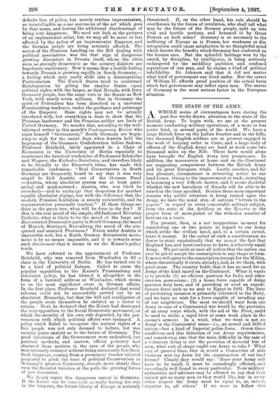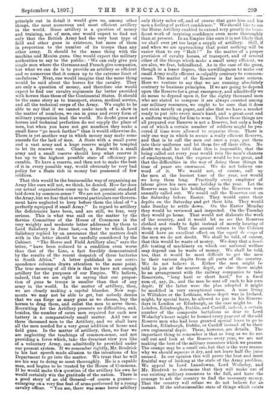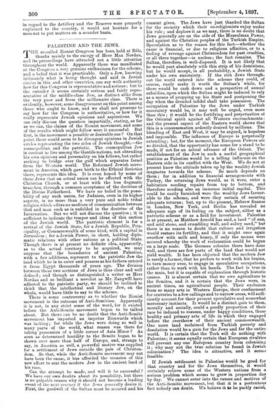lith STATE OF THE ARMY.
AWHOLE series of circumstances have during the past few weeks drawn attention to the state of the British Army. To begin with, we are at the present moment conducting military operations, of a more or less active kind, in several parts of the world. We have a large British force on the Indian frontier and in the hills, two thousand English soldiers are at present engaged in the work of keeping order in Crete, and a large body of officers of the English Army are hard at work some two thousand miles up the Nile. These facts would alone have brought the English Army into prominence. In addition, the manoeuvres at home and on the Continent are suggesting comparisons between the British Army and its great European rivals. Lastly, another, and far less pleasant, circumstance is attracting notice to our land forces. Owing to the improvement in trade, recruiting is becoming a very difficult matter, and it seems doubtful whether the new battalions of Guards will be able to be raised in the time specified. Besides these more important reasons why public attention is being turned upon the Army, we have the usual crop of autumn "letters to the papers" in regard to every conceivable military subject, from the state of the Artillery or the Reserve to the proper form of mess-jacket or the orthodox number of buttons on a. tunic.
The present, then, is a not inopportune moment for considering one or two points in regard to our Army which strike the civilian mind, and, to a certain extent, leave it uneasy. At the outset of such a consideration we desire to state emphatically that we accept the fact that England has, and must continue to have, a relatively small Army. We put aside at once all notion that the nation can ever be got to accept the conscription in any shape or form. It never will agree to the conscription (except for the Militia, where theoretically it exists already), and, as we think, with good cause. The country holds that it has no need for an Army of the kind raised on the Continent. What it wants is to provide (1) an efficient garrison for India and other over-sea possessions ; (2) a home force capable of doing garrison duty here, and of providing at need an expedi- tionary force such as we sent to Egypt in 1881. The duty of preventing invasion is primarily entrusted to the Navy, and we have no wish for a force capable of invading any of our neighbours. The most we should want from our Army in case of a Continental war would be the provision of an army corps which, with the aid of the Fleet, could be used to strike a rapid blow at some weak place in the enemy's armour. In a word, what we want is not an Army in the Continental sense—i.e., an armed and drilled nation—but a kind of Imperial police force. Given these conditions and this definition of our Army requirements, and considering also that the main difficulty in the case of a voluntary Army is not the provision of material but of men, what sort of shape ought our Army to take ? What sort of general lines, that is, would a Committee of able business men lay down for the organisation of our land forces ? Clearly they would say : ' Since your Army will have to be small, it must be exceedingly efficient, and exceedingly well found in every particular. Your military authorities and advisers may be allowed to say that they cannot get as many men as they would like, but in every other respect the Army must be equal to, or, rather, superior to, all others.' If we were to follow this principle out in detail it would give us, among other things, the most numerous and most efficient artillery in the world. Since artillery is a question of money and training, not of men, one would expect to find not only that the British Army had the very best type of field and other guns in existence, but more of them in proportion to the number of its troops than any other army. It should be the same thing with the machine and Maxim guns. One would expect the military authorities to say to the public : We can only give you single men where the Germans and French give companies, but what we can do is to provide an artillery so efficient and f40 numerous that it comes up to the extreme limit of usefulness.' Next, one would imagine that the same thing would be said about the horses for the cavalry. They are only a question of money, and therefore one would expect to find our cavalry regiments far better provided with horses than those of the Continental States. It should be the same story as to transport, stores, medical service, and all the technical corps of the Army. We ought to be able to say that if we cannot make much of a show in the matter of numbers, we can in guns and every form of military preparation lead the world. No doubt guns and horses and technical perfection do not supply the place of men, but when you have not got numbers they make a small force "go much farther" than it would otherwise do. There is yet another way in which money may make some amends for the lack of men. A State with a small purse and a vast army and a huge reserve might be tempted to let its reserve rust. Clearly, a State with a small army and a small reserve should keep what reserve it has up to the highest possible state of efficiency pro- curable. To have a reserve, and then not to make the best of it in every possible way, would obviously be very bad policy for a State rich in money but possessed of few soldiers.
That this would be the businesslike way of organising an Army like ours will not, we think, be denied. How far does our actual organisation come up to the general standard laid down by common-sense ? We are not pessimists about theArmy, but we fear that in several particulars our Govern- ment have neglected to keep before them the ideal of "a perfectly equipped if small Army." In regard to artillery the deficiencies have been, and are still, we fear, very serious. This is what was said on the matter by the Service Committee of the House of Commons in the very weighty and moderate letter addressed by them to Lord Salisbury in June last,—a letter to which Lord Salisbury replied by an assurance that the matters dealt with in the letter should be carefully considered by the Cabinet. "The Horse and Field Artillery also," says the letter, "have been reduced to a condition even worse than that of the Line, a fact forcibly demonstrated by the results of the recent despatch of three batteries to South Africa." A letter published in our corre- spondence columns draws attention to the same point. The true meaning of all this is that we have not enough artillery for the purposes of our Empire. We believe, indeed, that we are right in saying that our propor- tion of guns to troops is smaller than that of any army in the world. In the matter of artillery, then, we are clearly making a capital blunder. New regi- ments we may not be able to get, but nobody denies that we can forge as many guns as we choose, buy the horses to drag them, and enlist the men to serve them. Recruiting for the Artillery presents no difficulties, and, besides, the number of extra men required for each new battery is a comparatively small matter. Add two or three thousand men to the Artillery, and we shall have all the men needed for a very great addition of horse and field guns. In the matter of artillery, then, we fear we are neglecting the teachings of common-sense, and not providing a force which, take the dreariest view you like of a voluntary Army, can admittedly be provided under our present system. If we remember rightly, Mr. Brodrick in his last speech made allusion to the intentions of his Department to go into the matter. We trust that he will see his way to doing so most thoroughly. He is a capable man, and begins to be trusted by the House of Commons. If he would make this question of the artillery his own he would certainly win the gratitude of the nation. There is a good story of an old General—of course a gunner— enlarging on a very fine feat of arms performed by a young cavalry officer. "You see, there was some horse artillery only thirty miles off, and of course that gave him and his men a feeling of perfect confidence." We should like to see the Horse Artillery enabled to extend very greatly its bene- ficent work of inspiring confidence even more thoroughly than at present. In an Empire like ours it is not likely that we shall ever get too large a supply of artillery. Still, if and when we are approaching that point nothing will be easier than to cry " Halt ! " In the matter of a proper provision of cavalry horses, of transport, and of several other of the things which make a small army efficient, we are also, we fear, behindhand. As in the case of the guns, though in a lesser degree, this unwillingness to make our small Army really efficient is culpably contrary to common- sense. The matter of the Reserve is far more serious. Here we venture to say that we are running absolutely contrary to business principles. If we are going to depend upon the Reserve for a great emergency, and. admittedly we do mean to depend upon it, for the eighty thousand men who are stated to compose it are always counted among our military resources, we ought to be sure that it does not exist merely on paper, and also that we have a musket ready to put into every man's hand, and a great-coat and a uniform waiting for him to wear. Unless these things are all prepared our Reserve is not a Reserve, but only a body out of which a certain number of soldiers might be pro- cured if time were allowed to organise them. There is only one way in which to secure a really efficient Reserve, and that is to call the men out once a year, put them into their uniforms and let them fire off their rifles. No doubt we shall be told that this is impossible, that the being called out every year would ruin the men's chances of employment, that the expense would be too great, and that the difficulties in the way of doing these things in time of peace are enormous. We do not believe one word of it. We would not, of course, call up the men at the busiest time of the year, nor would we keep them long. Practically every employer of labour gives his men some holiday in the year. Let the Reserve man take his holiday when the Reserves were annually called out. We would call the Reserves out on the Saturday before Easter. They would enter their depOts on the Saturday and get their kits. They would take Sunday to settle down. On the Easter Monday they would be reviewed and inspected. On the Tuesday they would go home. That would not dislocate the work of the country, and it would let us see the Reserves clothed and ready to fight instead of merely hearing of them on paper. That the annual return to the Colours would have an excellent effect on the esprit de corps of the men we do not doubt. We shall be told, of course, that this would be waste of money. We deny that a bond- fide testing of machinery on which our national welfare may depend can be waste of money. We shall be told, too, that it would be most difficult to get the men to their various depots from all parts of the country. We do not believe it. Either the men might be told to join at the nearest depot, or else there might be an arrangement with the railway companies to take Reservists, "long haul or short haul," for a fixed sum of, say, 2s., and the men be sent off each to his own depOt. If the latter were the plan adopted it might be modified in very exceptional cases. A man living in Wiltshire or the Lothians, whose depOt was in Ireland, might, by special leave, be allowed to put in his Reserve days in London or Edinburgh, as the case might be. In London, Edinburgh, Dublin, and Cardiff, indeed, a certain number of the composite battalions so dear to Lord Wolseley's heart might be formed every year out of the odd Reserve men who had been granted special leave to go to London, Edinburgh, Dublin, or Cardiff instead of to their own regimental depot. These, however, are details. The important thing to remember is that as long as we do not call out and look at the Reserve every year, we are not making the best of the military resources which we possess. The orange may be a small one, but that is the very reason why we should squeeze it dry, and not leave half the juice unused. In our opinion this will prove the best and most fruitful way of looking at the state of the Army problem. We appeal to Lord Lansdowne, Lord Wolseley, and Mr. Brodrick to determine that they will make use of our existing military resources to the full, and have the courage to ask the country to find the necessary money. That the country will refuse we do not believe for an instant. If the unbusinesslike state of things which exists in regard to the Artillery and the Reserve were properly explained to the country, it would not hesitate for a moment to put matters on a sounder basis.




































 Previous page
Previous page